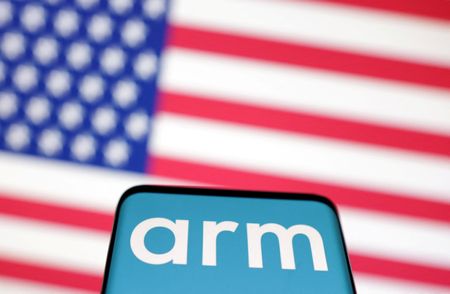By Manya Saini, Jaiveer Shekhawat and Stephen Nellis
(Reuters) – SoftBank Group-backed Arm Holdings’ annual revenue dropped 1% due to a slowdown in smartphone sales, the chip designer disclosed in its paperwork for a U.S. initial public offering (IPO) that is expected to be the largest listing of the year.
Its stock market launch is expected to bring back to life a lackluster IPO market, which has over the last year seen many high-profile startups put off their listing plans due to market volatility.
The British firm has survived the chip industry downturn better than most and is moving into segments that are still booming, such as cloud computing.
For the year ended March 31, Arm’s sales fell to $2.68 billion, hurt mainly by a slump in global smartphone shipments. Sales for the quarter ended June 30 dropped 2.5% to $675 million.
Arm said more than 50% of its royalty revenue for the most recent fiscal year came from smartphones and consumer electronics. The global smartphone market is on track to hit a decade low this year, according to Counterpoint Research.
Arm’s modest decline in revenue, despite heavy reliance on smartphones for royalties, suggests its per-chip rates have increased.
The company, whose chip technology powers most smartphones including iPhones, did not reveal the number of shares it was planning to sell and the valuation it would seek.
Reuters has previously reported that SoftBank was planning to sell about 10% of Arm’s shares in the IPO and seek a valuation of between $60 billion and $70 billion for the chip designer.
Arm was earlier planning to raise between $8 billion to $10 billion from the IPO, but is now expected to raise less capital, after SoftBank bought the 25% stake in Arm it did not directly own from its Saudi-backed Vision Fund.
SoftBank confirmed the deal with the Vision Fund in its filing on Monday. Shares of the Japanese conglomerate closed up 1.4% on Tuesday.
“Although they (market conditions) look a little more clement compared to the volatility which hit the tech sector last year, recent summer weakness is clearly pushing the firm to list Arm sooner rather than later,” said Susannah Streeter, head of money and markets at Hargreaves Lansdown.
SECOND CRACK AT IPO
Founded in 1990, Arm was launched as a joint venture between Acorn Computers, Apple (when it was known as Apple Computer), and VLSI Technology. The company was listed on the London Stock Exchange and the Nasdaq from 1998 until 2016 when SoftBank took Arm private for $32 billion.
SoftBank began preparing for an IPO of Arm after a deal to sell the company to Nvidia for $40 billion collapsed last year over objections from U.S. and European antitrust regulators.
Arm makes money from upfront licensing fees for technology and then a royalty paid on each chip sold by Arm’s customers.
The company has been expanding those royalty revenues, saying the newest version of its technology has the “potential to drive our royalty opportunity per device even higher,” according to its filing.
Arm’s chip designs dominate the smartphone industry, but they are also used in laptops made by Apple and some Windows machines.
Its technology has also gained 10% market share in cloud computing, where Arm-based chips are used in networking as well as the central processors in servers.
The one place where Arm has yet to make major inroads is in the artificial intelligence (AI) market, where Nvidia is the leading player, though Nvidia does offer an Arm-based processor as part of one of its “superchip” offerings that combines an AI chip with a traditional central processor.
“The obsession with all things AI is still super-strong and the semi-conductor designer will be using AI as its calling card to entice investors as it heads towards the launch,” Streeter said.
Arm said 24% of its revenue came from China in its most recent fiscal year. That is broadly in line with many other companies in the chip industry, but its revenue comes through Arm China, a separate company in which it only has an indirect 4.8% stake.
Arm said export controls imposed by the U.S. and British governments and a general downturn in the Chinese economy mean it expects declining royalty revenue as well as licensing revenue from China.
In August, Reuters reported that SoftBank had held talks with several technology companies, including Amazon.com and Nvidia, which are considering investing in Arm’s IPO.
Arm’s listing is expected to provide a much-needed boost to the IPO market, with big names including grocery delivery service Instacart, marketing automation firm Klaviyo, and German sandal maker Birkenstock expected to go public in the coming weeks.
Arm said it expects to list on the Nasdaq and trade under the ticker symbol ‘ARM’.
Barclays, Goldman Sachs, JPMorgan Chase, and Mizuho Financial Group are the lead underwriters for the offering.
Arm, which tapped a total roster of 28 banks for the IPO, has not picked a traditional “lead left” bank and will split underwriter fees evenly among the top four banks.
(Reporting by Manya Saini and Jaiveer Shekhawat in Bengaluru and Stephen Nellis in San Francisco; additional reporting by Max Cherney in San Francisco and Echo Wang in New York; Editing by Anirban Sen, Stephen Coates and Arun Koyyur)






